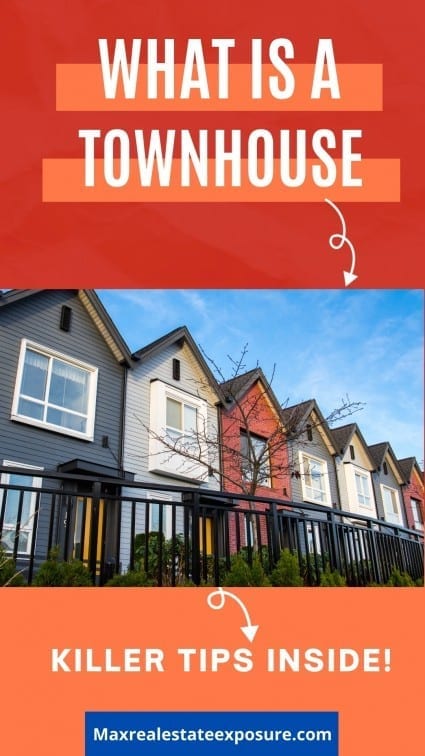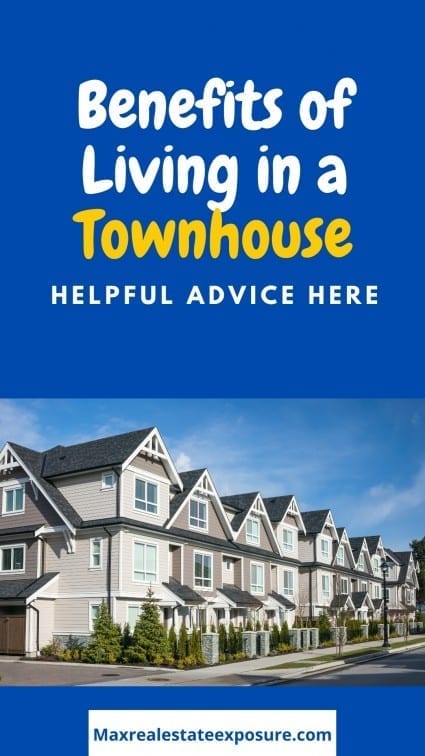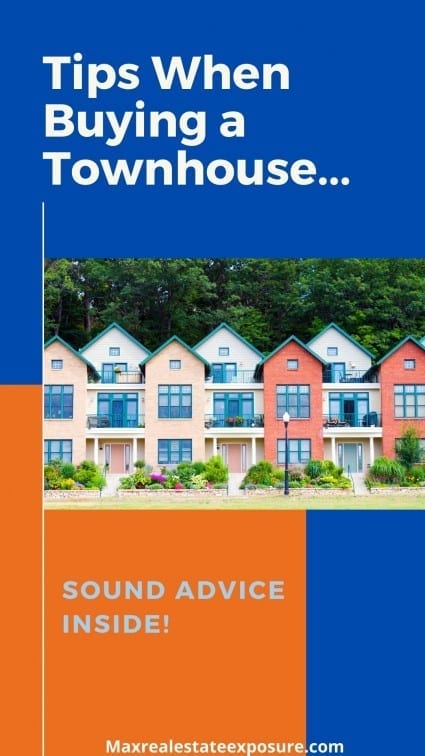The Ultimate Guide to Understanding Townhouses
 Are you thinking about buying a townhouse? Many potential buyers ask what a townhouse is.
Are you thinking about buying a townhouse? Many potential buyers ask what a townhouse is.
Townhouses are once again becoming popular with homebuyers. The increased popularity is thanks to buyers looking for low-maintenance homes near amenities they can walk to and offer better value.
Many people purchase a townhouse as a second home in vacation destinations.
A significant attraction for doing so is the lack of regular maintenance associated with owning a home.
In most instances, you will not be responsible for exterior maintenance with a townhouse. They are pretty different in that respect to single-family homes.
It should be noted that townhouses and townhomes are interchangeable words with the same meaning.
Let’s look at the benefits of living in a townhouse so you can decide if it’s right for you.
There will always be pros and cons to this style of housing choice. As a Realtor who lives in a unit and has sold hundreds of them over the years, I believe they are an excellent housing choice.
We will cover in-depth everything to know about a townhouse.
What is a Townhouse?
During my thirty-eight years as a real estate agent, many people have asked me what a townhouse is. They usually want to know if there is a difference between a townhouse and a condominium.
Quite often, real estate terminology gets interchanged.
A townhouse is defined as multi-level housing that shares walls with adjoining properties. Each home has an entrance with a small lawn area in the front and back of the unit.
Townhomes originated in England in the 1600s and were constructed in major Northeastern US cities, including New York, Boston, and Philadelphia, in the 1700s.
In New York City, they were later transformed into rowhouses, usually built in four- to eight-unit buildings.
Newer townhouse constructions are more likely to have a uniform look and have a homeowners’ association managing the development.
Condominiums often have a homeowners association that is specific to a particular development. Condominium associations are established to help maintain a certain standard in a neighborhood.
For example, associations are developed to keep the properties in good repair and appearance.
Townhouses Will Have An HOA Started By The Developer
The developer who builds the neighborhood and accompanying townhouses usually funds the HOA. The developer establishes the association, as well as the rules and regulations that it will uphold.
When construction is completed, the builder turns the community over to the homeowners who have purchased homes. A board of owners is then elected to oversee the homeowners association. It is very similar to a condo association in that respect.
HOAs are despised by some and loved by others. Before purchasing a townhome, you should have a firm grasp of what rules and regulations you must follow under the homeowners association.
Here are some of the standard rules with homeowners’ associations. Finding out if you can stomach the requirements when buying a townhome will be imperative.
Facts to Know About Homeownership in These Residences
1. A townhouse is a type of multi-level residential housing usually vertically attached to similar units.
2. Townhomes are often found in urban areas and offer a more affordable alternative to detached single-family homes.
3. They typically have multiple floors, with bedrooms and living spaces spread across different levels.
4. They have shared walls with neighboring units but usually have their private entrances.
5. A narrow, rectangular shape often characterizes these housing units.
6. Many townhouses have common areas, gardens, or recreational facilities such as fitness centers shared among residents.
7. The architectural design can vary widely depending on their location and the builder’s style preferences.
8. Townhomes provide an intermediate option between apartment living and owning a detached home.
9. Some townhouse complexes may have homeowners’ associations that maintain shared spaces and enforce rules for residents.
10. Townhouses are popular among individuals or families seeking a balance between affordability, convenience, and privacy in the city and suburbs.
How Much Does it Cost to Buy One?
The price of a townhouse varies depending on several factors, including the location, size, amenities, and condition.
Potential buyers also need to factor in the monthly HOA fees. Like other properties, they will have a property tax assessment and homeowners insurance costs.
Will They Increase in Value?
Yes. You can expect townhouses to appreciate similarly to other properties. They are a popular housing choice among a significant percentage of the population.
Home buyers and future sellers can expect the future resale value to be excellent.
What is The Difference Between a Townhouse and a Condo?
Many folks ask what the difference is between a condo and a townhouse. Condominium owners only own the interior of their units.
In most circumstances, with townhouses, you own the interior and exterior, including the driveway and lawn, but not the communal areas.
Having common areas in condos is the most significant difference between a townhouse and a condominium. Condo owners share in the expense of keeping up the common areas. Townhouses do not have this issue to worry about.
Condos come in many different architectural styles, from high-rise buildings to ranches to traditional homes.
Townhomes, on the other hand, are usually designed in rows, but not always.
Sometimes, you will see townhouses built as duplexes. Whether buying a townhouse or a condo, following some sensible tips before purchasing will be wise.
Here is a complete overview of the difference between a condo and a townhouse.
Buying a condo or a townhouse is much different than purchasing a house. These residences are not like houses because they share walls with others.
Townhouses vs. Row Houses
Sometimes row houses and townhouses are used interchangeably as well. A row house is not technically the same. A rowhouse will line a street in a row, whereas townhouses can be grouped or separated within a development.
Rowhouses tend to be identical, whereas a townhome could have more architectural differences. With a row house, you won’t have a distinct look.
A row house is also considered a single-family house attached to common walls. However, the shared wall characteristic differs from a traditional standalone single-family home.
These are significant differences because if you are used to single-family homes and purchase a row house where adjacent units share walls, you might need to work hard to get used to them.
In addition, detached homes offer far more privacy than either townhouses or row houses.
Complex Ownership Location
Ownership tends to occur in suburban areas within subdivisions or neighborhoods forming a townhouse community. Townhome owners are responsible for ensuring their community of buildings looks excellent while maintaining their yards and driveway.
It is not uncommon for a townhome to have a backyard, whereas a condo will have a more limited space.
Quite often, townhomes are second homes that require less maintenance because the expenses of maintaining the exterior are shared. They tend to be an excellent option for folks who don’t want to spend time making improvements and repairs to their houses.
Unlike a traditional house, someone else will be in charge of maintenance.
Video: What is a Town House
This short video will provide more tips on understanding these residences.
What are the Benefits of Living in a Townhouse?
 Choosing a townhome offers many advantages; let’s take a look:
Choosing a townhome offers many advantages; let’s take a look:
Expenses Might Be Less
This type of housing takes up less room than your average or traditional family home.
In addition, because townhouses share common walls and have a smaller footprint, they usually cost less than single-family homes in the same area, even if they have similar square footage.
This allows you to buy closer to the city center without compromising on square footage, which can mean more value for your money in the area you want to live in.
The same holds if you are in suburban areas as well.
They Require Fewer Repairs Paid By Owners
The more compact size of a townhouse means less repair work. If the home is part of an HOA, you’ll have even less to worry about, with the association taking care of much of the exterior maintenance.
A significant attraction for those buying townhouses is the lack of upkeep.
Outdoor Areas Are Smaller With These Residences
There is often a small amount of yard space available with townhouses. This gives you some outdoor space without much maintenance to keep it tidy.
Almost always, you will not be required to mow your lawn or plow your driveway. Instead, these tasks will be outsourced to other businesses.
The individual owner will occasionally be responsible for general maintenance items like the yard. This is usually done to lower costs and keep monthly fees down for unit owners.
Remember this if you are trying to avoid all yardwork responsibilities.
They Often Offer Additional Amenities
Community facilities, such as a swimming pool, tennis court, gym, or other similar perks, are more likely to be present in new developments.
Tennis courts and pools are prevalent in warmer climates where they can be used all year round.
Additionally, there are often different established groups of residents who participate in activities they enjoy. These features are considerations for many home buyers choosing a townhouse HOA.
Negatives of Living in a Townhouse
There are a few negatives that could put you off living in a townhome development; these include:
Noisy Neighbors
 Since you share walls with your neighbors, you will likely hear more of them.
Since you share walls with your neighbors, you will likely hear more of them.
You can expect this noise to be worse than if you’re in another type of single-family home, and you could get noise from both sides.
If you don’t want to hear your neighbor’s son playing drums at 11 p.m., living in a townhouse may not suit you.
A significant drawback of living in townhouses is a lack of control over what other people do and how they live.
They Have Multiple Floors
While multi-level structures may not be an issue for many people, it could be a problem for some.
For example, living space spread across several floors could create problems for people with mobility issues.
If this sounds like you, seeking out an over 55 development with ranch-style condos would be wise.
Homeowners’ Associations Have Restrictions
If the home is subject to an HOA agreement, you might be restricted in what you can do to the property.
As mentioned, checking out the established rules and regulations before purchasing a townhome is vital. If you don’t want someone telling you that having a garden or planting flowers isn’t possible, research the laws first.
For animal lovers, some allow pets, and others don’t.
You will want to find out if the townhome community is the right fit for you. Townhouses can be great choices, but they can be terrible if you don’t like rules, like condos.
Many horror stories exist of people living within townhouse communities where board members are entirely unreasonable. Some of them are on the board just for a power trip.
They get pleasure from telling others what they can and cannot do. You could be dealing with an unruly homeowners association, which would be unpleasant.
So, as you can see, there are pros and cons to purchasing this kind of home.
Townhome Buying Tips
There are a few extra things to consider when buying a townhome. Let’s look at the issues:
Setting Your Budget is Essential
 Before looking for a suitable townhome, you need to know how much you can afford to spend. While buying a townhouse could offer more value for money, it could still be relatively expensive as it will be closer to central locations.
Before looking for a suitable townhome, you need to know how much you can afford to spend. While buying a townhouse could offer more value for money, it could still be relatively expensive as it will be closer to central locations.
You must also factor in any HOA payments and ordinary home expenses. Make sure you understand what the condo fee covers.
Are there any upcoming special assessments that you need to be aware of? After purchasing, it will be troublesome to know that you’ll be on the hook for a significant expense you didn’t expect.
Community Wishlist
In addition to knowing what you want from the house, you must consider what amenities you want in the community areas.
For example, is a swimming pool important, would you like a community center, or do you want increased security?
Your Neighbors
When viewing a home you like, it’s a good idea to listen out for noise being made by the next-door neighbors.
Since you will share walls with them, you want to know what you will be up against.
If you can talk with your potential neighbors, you can ask them about the community you are considering moving to. They might reveal some information about the HOA and other issues that are going on.
This will give you a better understanding of the area and help you decide if this is the townhome for you.
Check Out Community Areas
If a home is part of an HOA and offers some community amenities, it is good to check them out first. Are they in good condition, and do they suit your needs?
Understand The Rulebook
Before continuing the house purchase, you need to read the HOA rules. Even if you like home, overly restrictive HOA rules could be problematic for some people.
Alternatively, they might not be strong enough. Check what you are allowed and prevented from doing to ensure it fits with what you want from a home.
They Might Not Make Sense if You’re Older
Even though you may have no problems tackling the stairs now, it may not be the case in the future. If you want to buy a house for the long term, many stairs may not be ideal.
When you are getting up there in age, one-floor living might be a better choice.
Find a Mortgage Lender For Financing
Like purchasing any other home, you must find a lender you’re comfortable working with for financing. There are plenty of lenders to choose from that would love to do business with you.
FHA mortgages can be great options due to their low down payment requirements. Mortgage rates for these loans are competitive, so don’t restrict yourself to one option.
There are many loans from various lenders worth researching. Ask your Realtor for help or provide a recommendation for the lenders they use.
Comparing Townhouses to Condos and Apartments
There are some similarities between these housing types, with some significant differences.
Condos
Townhouses vs. Condos
Usually, condos are situated in more significant buildings with many floors. There will probably be many condos in each of these large buildings, which the occupant can rent or own. They generally offer less space than a townhouse, though.
Condos can be better for people who want the security of living in a managed building. They also offer lower maintenance and can provide more chances to socialize with the neighbors. Townhouses are a form of condominium ownership, though.
When buying into townhouse developments, you should ask questions beforehand. Make sure you get the answers you want before moving forward. As previously mentioned, condos are a form of ownership where you only own inside the interior walls.
This type of ownership is unsuitable for everyone and may be wrong for you. Therefore, a lot of research beforehand is always wise.
Whether you are buying a condo or townhouse make sure you ask the real estate agent tons of questions.Click To TweetApartments
Townhouses vs. Apartments
Apartments are different because a landlord owns them, and everyone rents from them. In contrast, a townhome can either be rented or purchased outright.
Apartments can offer an even lower cost of living, with better access to entertainment centers and restaurants.
After researching townhouses for sale, you may decide that renting an apartment is a better choice. Apartment building life is certainly a lot different than in most townhome communities.
They are excellent choices for some and not so much for others.
Townhouses
These homes can be suitable for a wide range of people. If you are looking for more space than a condo provides and are on a more limited budget, this could be the best choice.
They give you more room in a location that could otherwise be out of your reach and are often attractive to first-time buyers. But, of course, after reading, you know this by now anyway.
Townhomes are sometimes referred to as townhouse apartments because they share a wall similar to an apartment.
Modular Construction
It is far less common to see modular construction in townhouses. The vast majority of the time, townhomes are stick-built.
Modular construction could become more popular with townhouse construction at some point, but it hasn’t.
Most of the time, you will only see modular construction with detached homes.
Townhouses Near Me
You may wonder how to find townhouses you might be interested in. Hooking up with a local real estate agent is essential.
You will want a buyer’s agent that knows the market inside and out. They should be seasoned and understand the local inventory and neighborhoods.
If you are new to the area or are just starting your search, it could be worthwhile to try searching online. You can use townhouses near me or townhouses near me for sale to see some of the communities close to your location.
Recap of The Pros and Cons
Pros
- Less expensive than comparable size single-family homes.
- Less exterior maintenance.
- Sense of community by sharing communal space.
- Potential extra amenities include a clubhouse, swimming pool, fitness center, and tennis court.
Cons
- Less privacy.
- Potential for noisy neighbors.
- It might be part of an undesirable HOA.
- They often have multiple flights of stairs.
Noteworthy Statistics on This Housing Choice
1. Townhomes typically consist of 2 to 3 stories, accounting for roughly 85% of all townhouse designs.
2. On average, they measure around 1,800 square feet.
3. Approximately 70% feature private attached garages for residents.
4. In urban areas, the median price of a townhouse is approximately $500,000.
5. Around 60% have at least one outdoor space, such as a patio or balcony.
6. Most communities have shared amenities, with an average of 1 park or recreation area per 25 units.
7. Regarding ownership, 75% are privately owned by individuals or families.
8. On average, each complex houses around 42 units.
9. Approximately 80% of new construction in suburban areas consists of townhomes.
10. Townhouses are most commonly found in densely populated urban areas, representing over 45% of the housing market in those locations.
FAQs
How Much Do They Typically Cost?
Townhouses typically vary in price depending on various factors such as location, size, and amenities. In general, the cost can range anywhere from $200,000 to $800,000.
However, it is essential to note that these are just average figures, and there can be significant deviations from this range. Factors such as the neighborhood’s desirability, proximity to amenities, and the current real estate market conditions can significantly influence the price.
It is always recommended to consult with a real estate agent or conduct thorough research to get accurate and up-to-date pricing information for them in your desired area.
How Are They Managed in Terms of Maintenance and Repairs?
These residences are typically managed through a homeowners association (HOA) that oversees the maintenance and repairs of the common areas and exterior components of the community.
The HOA collects monthly fees from the owners to cover these costs. They employ a dedicated team of professionals, including property managers and maintenance staff, to ensure that all necessary repairs and maintenance tasks are done promptly and efficiently.
The HOA may establish guidelines and regulations for individual townhome owners to follow to maintain their units, ensuring a cohesive and well-maintained community overall.
Who Typically Lives in Townhomes?
They are a popular housing option that attracts a diverse range of residents. Typically, these homes are favored by young professionals and families who desire the convenience of urban or suburban living without sacrificing space and privacy.
A townhouse layout allows for multiple levels, providing ample room for individuals or growing families. The proximity to amenities such as parks, schools, and shopping centers makes them attractive for those seeking a balanced lifestyle.
Overall, they cater to a wide demographic, offering a comfortable and convenient living experience for people from all walks of life.
Final Thoughts
Before investing in a townhome, deciding whether this kind of lifestyle will fit your needs is vital. Unfortunately, many buyers who have previously owned homes purchase townhomes and end up disappointed.
More often than not, it boils down to the feeling of being restricted.
While it is a great feeling to be part of a community when things are run well, it can be a horror show when they are not.
If you feel being the king of your castle is necessary, owning a townhome might not suit you. Hopefully, you have enjoyed this townhouse guide and learned something from it.
About the Author: Bill Gassett, a nationally recognized leader in his field, provided the above real estate information on what a townhouse is. He is an expert in mortgages, financing, moving, home improvement, and general real estate.
Learn more about Bill Gassett and the publications he has been featured in. Bill can be reached via email at billgassett@remaxexec.com or by phone at 508-625-0191. Bill has helped people move in and out of Metrowest towns for the last 38+ years.
Are you thinking of selling your home? I am passionate about real estate and love sharing my marketing expertise!
I service Real Estate Sales in the following Metrowest MA towns: Ashland, Bellingham, Douglas, Framingham, Franklin, Grafton, Holliston, Hopkinton, Hopedale, Medway, Mendon, Milford, Millbury, Millville, Natick, Northborough, Northbridge, Shrewsbury, Southborough, Sutton, Wayland, Westborough, Whitinsville, Worcester, Upton, and Uxbridge MA.

